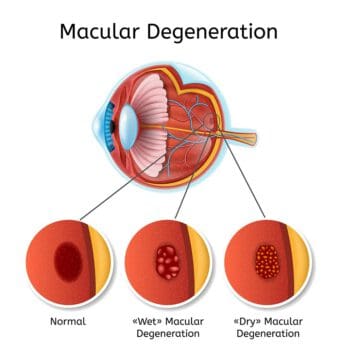Macular Degeneration Cures: Do They Work? (Injections)
Last Updated:
Yes, injections for wet age-related macular degeneration (AMD) work, but they don’t cure the condition. Instead, they treat the condition, preventing further vision deterioration.
The most common and effective treatment for wet AMD is injections that are administered directly into the eye. These injections are called anti-VEGF treatments. In 9 out of 10 cases, these in-eye injections stabilize vision in those with retina-related disorders, such as wet macular degeneration.
Table of Contents

Eye Injections for Macular Degeneration
Eye injections are effective in treating wet macular degeneration. Research indicates that in 90 percent of cases, vision will not deteriorate further in cases of wet AMD treated with anti-VEGF treatments.
Recent studies also show that approximately 50 percent of AMD patients receiving injections had 20/40 vision or better in the eye receiving treatment after five years. Before anti-VEGF injections, less than 10 percent of those with wet AMD were able to keep 20/40 vision after two years.
You deserve clear vision. We can help.
With 135+ locations and over 2.5 million procedures performed, our board-certified eye surgeons deliver results you can trust.
Your journey to better vision starts here.
How Do They Work?
Wet age-related macular degeneration is caused by abnormal blood vessels forming on the retina and macula. Anti-VEGF injections work by blocking VEGF, vascular endothelial growth factor.
VEGF is a protein that is made by cells in the body in order to produce more blood vessels. In some people, too much VEGF is produced. This can lead to wet AMD and other problems.
By blocking VEGF, eye injections can halt or slow the growth of the blood vessels that are forming on the retina and macula, causing AMD. This can stop the growth of problematic blood vessels, slow damage to vision, and even (in some cases) improve vision.
How Long Do They Last?
Most commonly, anti-VEGF eye injections for age-related macular degeneration are given monthly or bi-monthly. They may also be given every three months or on an as-needed basis.
AMD eye injections are given for as long as needed. Long-term treatment and/or monitoring may be required to ensure abnormal blood vessels don’t develop or cause further damage.
However, recent preliminary research does indicate that patients may be able to be successfully weaned off anti-VEGF treatments without risking their vision.
Are They Painful?
The eyes are numbed before injection (usually using eye drops), so the anti-VEGF procedure is not painful. It’s also generally very quick, with visits often taking only about 15 minutes.
What Therapy Is Right for You?
If you’ve been diagnosed with macular degeneration, your doctor will guide you on the best treatments for your condition. In order to determine which therapy is right for you, your doctor will assess the following:
- Your diagnosis: Do you have wet macular degeneration? Do you have dry macular degeneration? How long have you had problems with vision? Your doctor will want to know all about your history of this disease.
- Your progress: Your doctor will want to measure your visual acuity, your clinical symptoms, and more in order to determine the stage of your disease.
- Your eye health: Macular degeneration can increase the risk of complications if you have some types of eye surgery. Your doctor will need to ensure that your eyes are healthy.
- Your overall health: Some procedures require anesthesia, and some health conditions make anesthesia unsafe. Your doctor will need to understand how well your body is functioning before treatment begins.
- Your lifestyle and preferences: You may not want repeated treatments. You may not want to treat your eyes at home. You may be very afraid of surgery. Your doctor will need to understand what you prefer before therapy begins.
Eye injections are the available treatment for wet macular degeneration. Still, you may need to consult with your doctor about the frequency of injections and any additional supplements or treatments that could help.
Connect with a doctor you can trust, so you can make the best decision about your treatment. We can help.
At NVISION, we have trusted eye health professionals available to explain your options and help you make a smart choice. Contact us to set up an appointment today.
Discover Our Centers

See All Centers
You deserve clear vision. We can help.
With 135+ locations and over 2.5 million procedures performed, our board-certified eye surgeons deliver results you can trust.
Your journey to better vision starts here.
References
- Intravitreal Injection for Wet (Exudative) Age-Related Macular Degeneration (AMD). (August 2018). Medscape.
- Revolutionary Eye Drops to Treat Age-Related Blindness. (May 2017). Science Daily.
- Pain in the Eye Following Intravitreal Injections. (2017). Macular Society.
- Avastin, Eylea, and Lucentis — What’s the Difference? (July 2015). American Academy of Ophthalmology.
- Injections: Macular Degeneration Treatment (Part 4 of 11-Part Lecture). American Foundation for the Blind.
- Eye Drop for AMD? (May 2017). American Academy of Ophthalmology.
- Eye Drops Could Treat Age-Related Macular Degeneration. (October 2013). Live Science.
- Laser Photocoagulation for Age-Related Macular Degeneration. Johns Hopkins Medicine.
- Laser Treatment of Drusen to Prevent Progression to Advanced Age-Related Macular Degeneration. (August 2015). Cochrane.
- Macular Degeneration. Cleveland Clinic.
- Treatments: Age-Related Macular Degeneration. National Health Service (UK).
- Anti-VEGF Treatments. American Academy of Ophthalmology.
- Study Finds Up to 30% of Patients with Wet Macular Degeneration Can Safely Stop Eye Injections. (January 2022). Johns Hopkins Medicine.
- New Treatments for Age-Related Macular Degeneration. (February 2023). American Academy of Ophthalmology.
- How Effective Are Age-Related Macular Degeneration Treatments? BrightFocus Foundation.
This content is for informational purposes only. It may have been reviewed by a licensed physician, but is not intended to serve as a substitute for professional medical advice. Always consult your healthcare provider with any health concerns. For more, read our Privacy Policy and Editorial Policy.
